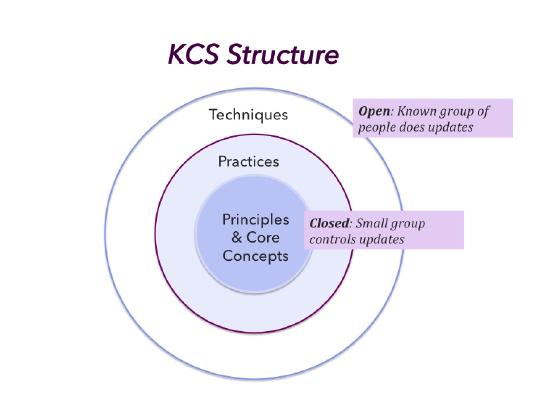Section 1 Knowledge-Centered Service
KCS v6 Introduction
Knowledge-Centered Service (KCS®) is a simple idea that creates profound benefits. If, as part of our workflow, we can reuse, improve, and (if it doesn't exist) create knowledge that is available to the entire organization, we can make gains in our operational efficiency, increase success with self-service, and improve our products and services while enabling organizational learning.
These profound benefits are realized by doing something... profoundly different. For most organizations, KCS represents a shift in thinking. To successfully adopt and sustain KCS requires a new way to think about work, people, measures, and process.
The KCS Principles and Core Concepts precedes the KCS Practices Guide and should be referenced before exploring the KCS Practices. KCS is built on a set of fundamental beliefs (four principles) that explain why we are doing what we do. The ten core concepts (which are more detailed) are based on one or more principles. The KCS Practices Guide focuses on the how; this document describes the best we know to-date about how to make KCS work.
While KCS v6 uses the same acronym as previous versions of the methodology, we have updated the name from Knowledge-Centered Support to Knowledge-Centered Service. This change reflects the broadening application of the methodology outside of the support environment, and stems from the definition of service science, coined by IBM Research as "an interdisciplinary approach to the study, design, and implementation of services systems – complex systems in which specific arrangements of people and technologies take actions that provide value for others.” (Wikipedia)
 The KCS v6 Adoption & Transformation Guide complements the KCS Practices Guide and the Measurement Matters paper. The Adoption Guide is the accumulation of twenty years of experience by the staff of the Consortium for Service Innovation. This guide provides a step-by-step approach for planning a KCS adoption. Our aim is to share what we have learned about what makes for a successful KCS adoption and help avoid some of the common mistakes.
The KCS v6 Adoption & Transformation Guide complements the KCS Practices Guide and the Measurement Matters paper. The Adoption Guide is the accumulation of twenty years of experience by the staff of the Consortium for Service Innovation. This guide provides a step-by-step approach for planning a KCS adoption. Our aim is to share what we have learned about what makes for a successful KCS adoption and help avoid some of the common mistakes.
The Consortium for Service Innovation is the non-profit association that developed and continues to maintain the KCS methodology; it is the source for KCS resources and the certifying body for KCS. The Consortium offers KCS certification for people and KCS Verified and Aligned designations for tools and services. The KCS Verified and KCS Aligned programs are useful for assessing technology to enable KCS. The Consortium nurtures a network of KCS practitioners and vendors who support the successful adoption of KCS and contribute to the continuous improvement of the KCS methodology across all knowledge-intensive industries.
The KCS® methodology is a registered service mark of the Consortium for Service Innovation. The first mention of KCS in a written work or presentation must include the superscript ®. Please also include this footnote or parenthetical statement: “KCS® is a service mark of the Consortium for Service Innovation™.”
KCS cannot be used in the name of a commercial offering without explicit written permission from the Consortium for Service Innovation. Please contact the Consortium with questions.
A Note on Usage and Style
In writing this document, we have made two assumptions about its use. First, although we like to read it through repeatedly, we expect that few people will read the entire publication end-to-end in one sitting. We have chosen to repeat a few of the key ideas and concepts where reinforcement will improve understanding and enable each section to be meaningful when read independently.
Secondly, we are expecting that readers will come from different environments. Most of the Consortium member experience is from customer facing support and internal help desks. Different groups use different vocabularies. We have attempted to present the concepts generically so that they will be easily understood, and we hope our word choice will not limit comprehension. We have provided a glossary in Appendix B to help define the terminology we use in KCS.
We are ready to start the KCS journey.
